By Prof. Indrajit S Saluja
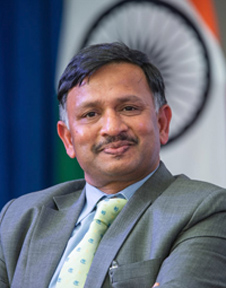
The Consul General of India at San Francisco, Dr. T.V. Nagendra Prasad joined the Indian Foreign Service in the year 1993. He has served in various positions at Indian Missions abroad, including Tehran, London, Thimphu, Berne and Ashgabat. He was India’s Ambassador to Turkmenistan from July 2014 to January 2018.
Within India, he served as Regional Passport Officer, Bengaluru(1999-2001) and as Project Director of the Passport Seva Project, one of the Mission Mode Projects under e-Governance(2008-2011).
Before taking over as the Consul General of India at San Francisco, Dr. Prasad served at the Ministry of External Affairs as Joint Secretary heading the Gulf Division. Dr. Prasad was born in the district of Warangal, Telangana. He graduated from the Andhra Pradesh Agricultural University and received his Doctorate from the prestigious Indian Agricultural Research Institute in New Delhi. He is married to Padmavathi and has one son.
I had communicated with Ambassador Prasad quite a few times before I got to get an appointment to interview him at the Consulate in San Francisco on August 29, 2022.
Pleasantries over, Ambassador Prasad settled down for a formal interview which took over 45 minutes. Dr. Prasad was candid, frank and forthcoming which made my task easier and pleasanter than I had expected. My experience with bureaucrats tells me they, having been trained in diplomacy, are quite adept in the art of deflecting conversation. It was a pleasure to be with a polite, charming and elegant person.
Here are excerpts from the interview.
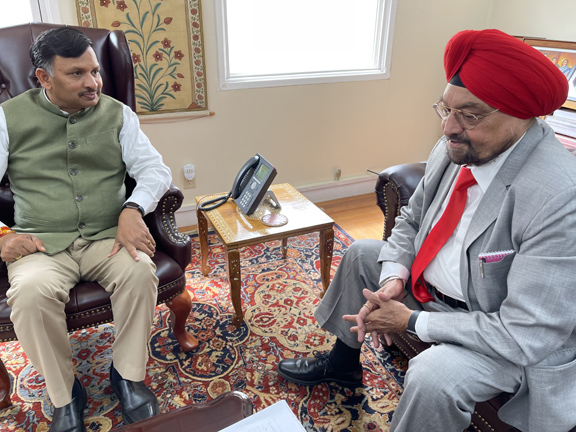
TIP: Your Consulate has an expansive jurisdiction. Have you been able to visit all States and territories in your jurisdiction?
A.: I haven’t done because of COVID. Because I joined in the midst of COVID, I couldn’t travel for the first one year. But later on, I started whenever a governor gave an appointment. I completed visiting almost all states.You see I have gone to most, and I’m going next month to Arizona. I want to see whether or not there is some purpose to a visit. For example, the other day I went to Reno, Nevada, met the community. There are a couple of temples and Indian community is growing there. And in Vegas, we have Las Vegas India Chamber of Commerce. That Chamber of Commerce was organizing a meeting with the Governor and the Congressman. So, I went there. So, most of the states I visited. Still there are a couple of states that I have to visit.
TIP:What I understand is you are doing two things simultaneously. Maybe the embassy in Washington is concentrating only on its relationship with the government at the government level. But in your case, you’re dealing not only with the community, but also with elected officials and the local government. What has been your experience with these elected officials?

A.: I will give you an example. The other day we were celebrating India’s 75 years of Independence in Milpitas. I could see 20 elected officials present. And an astounding 6000 enthusiastic Indian Americans were present. That shows the Indian community’s strong relationship with the elected officials. Not only that I received a letter from Governor Newsom saying that we congratulate you on 75 years of India’s Independence. So, this shows that we are able to reach out and then at the same time they are reciprocating our sentiments. The City Hall was flying tricolor and the Mayor declared August 15 as US India Friendship and Heritage Day and then they hosted a reception in the City Hall. We contact them and we continue our conversations with them. Our community is very influential. Our community commands respect with the elected members and that helps in establishing rapport with them. And at the level which is not at the level of superior and inferior but at the level of equals and that is very, very important.You go to any state Arizona. You have a community that has connected very well to the local government and local elected officials. I see it anywhere I go, without exception.
TIP: Don’t you think that the love for the land oforigin we see today is going to wane with the coming generations?
A.: Whenever I meet the community, I say that children who are born and brought up here also must know an Indian language. 50 to 60 schools are teaching Indian classical dance to thousands of children. One can see them dancing. You see them singing whatever the For example, even in case of language, these guys are teaching mother tongue on Saturday and Sunday. One is Telugu. I have seen one Tamil. I have seen Punjabi. It is basically to see that people don’t lose touch with their mother tongue. This is where the thing comes. You’re right. They are born here they are educated here. They will do a job here. Through this learning of language, music and dance. I think that is going to help us to keep them still attached.
And I see a lot of effort on the part of the community. That effort is very much continuing. But what happens to the current generation, that is the question.
We have to consistently follow up on whether the mother tongue is really going very well. You go to Seattle; you go to LA; Arizona, I saw the language schools are really doing well. And I can tell you some Institutes are there who give you a certificate of graduation in the mother tongue. So that is interesting.
TIP: What has been your effort for some outreach programs, you know, like, going to various states and holding consular camps. Do you do that?
A.: We hold camps. Like we had in Seattle, one for the community, one for the IT people, and so on. And in LA, we had one, related just to visa, passport and OCI card, or it is related to community issues. It all depends on the size of the community in that place, and the response. Many people would like to have their certificates and attestations. Many old people came to stay with their children and they have to send some documents to India to manage their properties or Nowadays our camps are different, unlike in the past. Okay, now we take the service provider VFS also with us.
TIP:So, during these camps did you ever find any people you know voicing their complaints against the VFS?
A.: See the FS VFS complaints during the camps I have not seen but on the email. Sometimes we get but it’s an evolving thing we keep on feeding them. We have nothing serious. Nothing serious against this company. The main complaint I used to get was they’re charging for the calls. And that was the main complaint. It was as per the agreement between government of India and VFS, and after these complaints they reduced the charge a bit but still I hear these complaints sometimes, and, mostly on the email. So, we also take note on a daily basis 300 to 400 emails. We keep on responding. We are trying to do our best. But the number of 1.5 million in the jurisdiction is formidable.
TIP: But you must have identified what the main issues are before the diaspora in your jurisdiction.
A.: See, for example, last Saturday, Sunday, both days, we opened the office for someone needing emergency services. We opened We opened our office. That is number two. And then I have launched one app which a chat box to work on our website.
TIP: When did you launch it?
A.: Last August. The chat box helps them on general queries and IT service, etc.
.TIP: Do you think OCI is, after passport and visa, the most sought-after document?
A.: I will give you an example. In our consulate’s history the highest number was around 27,000 in any year that OCI cards were granted. Last year we issued double the number because the visas stood suspended during the COVID time. And people with OCI were able to travel. So, people realizedthe value of OCI cards. That has increased number of OCI applications significantly in our consulate, and I think it will be the same with other consulates.
I see here huge rush for passport also because many people who come on H1etc. have to get their passports renewed. Even visa applications have been on the rise. Then E visa was opened up. It was a very heavy task. Indeed, many people are also applying for the visa online. We also get most attestations. People have property; people have parents who are writing their property in their name etc. That is also good rash we have.
TIP: Could you give us an idea of how many instruments or documents the consulate handles on a daily basis ?
A.: I have calculated last year we did about 140,000 services. This is minus emails, minus phone calls, minus just the documents.
TIP: What is the size of your staff here?
A.: I have around 38 or so , everyone, including local staff.
TIP: There is a large number of Indian students studying here and they’re young. How do you manage to have contact with the Indian student community taking care of their problems and helping them out?
A.: I meet them when I’m visiting a state. I make it a point to go to the university and meet all Indian students. I have done it in every State I visited.
We have a register of Indian students which is managed by the Embassy in Washington. Besides my regular contact with the students in different States, Ambassador Sandhu also meets them when he is on a visit to San Francisco Consulate jurisdiction. When Ambassador Sandhu came to LA last year, we had an interaction with students within UCLA and recently, when he came about 15 days back, we had interaction with students in San Diego
TIP:Many Government of India programs that came up a couple of years ago, like Startup India, Make in India etc. are no more heard of either from Indian politicians or from bureaucrats.
A.: Startup India is very much a vibrant program. India has the third largest ecosystem for startups. If you see government of India commerce ministryinventory, there are 60 ,000 to 70,000 startups in all the districts in India. I will give you an example, Here in Bay Area, there are venture capitalists. I have seen Indian startups being funded by them from here and mentored from here. Cross border collaboration in startups is really gaining.
TIP:What are going to be your significant activities in the coming months?
A.: We are going to do some We want to go around to every state at least once. That is one. Number two, cater investment techniques. So last year we did in Arizona, in Seattle, in Portland and then again, we want to do some. Third one is, we want to encourage our Indian tech leaders here to look at the opportunities in India. We are fastest growing large economy in the world. And we came out of COVID depression. So, we are trying to tell the people that opportunities are there. Please try and invest in India. So, that is a main objective.
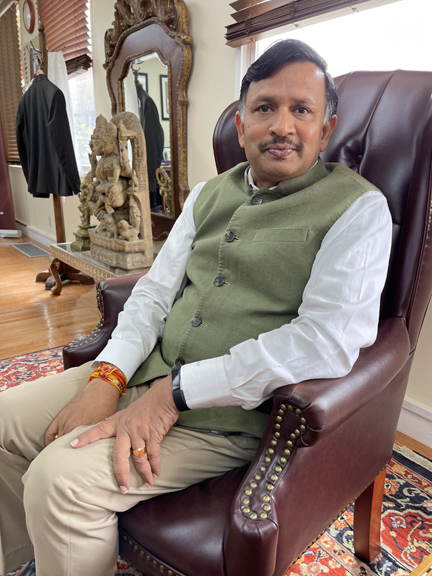
TIP: What message you would like to give to the Indian American community through The Indian Panorama?
A.: I want to say that we provide services efficiently, number one. Number two, please don’t go to an agent and get into trouble. We are here to support the community and take care of their needs.


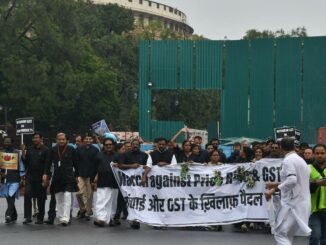

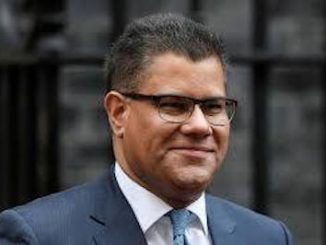
Be the first to comment